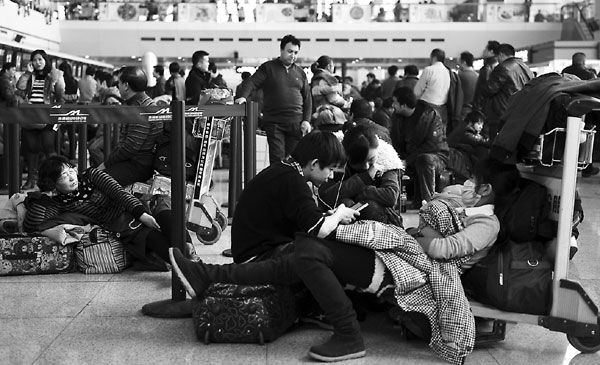More blocked noses due to smog
Updated: 2011-11-29 07:26
By Wang Qian and Mao Weihua (China Daily)
|
|||||||||||
 |
|
A large crowd of passengers is stranded at the Urumqi International Airport because of a heavy fog that shrouded the city on Sunday.Provided to China Daily |
URUMQI - Heavy smog is expected to continue until Wednesday in Urumqi, Xinjiang, causing a surge in the number of patients suffering from respiratory diseases, doctors warn.
"The number of patients coming to our hospital with respiratory problems has grown by about 20 percent since September," Wei Xuemei, deputy director of the division of respiratory diseases in the People's Hospital of the Xinjiang Uygur autonomous region, said on Monday.
She said severe air pollution, especially after the beginning of the heating season - which usually lasts from November to March - and heavy smog have jointly triggered the respiratory troubles.
Wei said the hospital is swept with infra-red rays once or twice every day to clean the air and its windows are kept shut during foggy days to prevent pollutants from entering.
Urumqi has long been troubled by heavy pollution in winter, largely because of the growing volume of emissions caused by artificial heating.
The pollution level in the winter almost doubles that of the summer, and heating emissions have been the main contributor to the surge, says Rui Lihong, deputy director of the Urumqi environmental protection bureau.
Although great efforts are being made across the city to reduce heating emissions in the winter, including dismantling about 2,000 small-sized heating stations every year and introducing central heating in recent years, the city's winter smog seems to last longer and grow denser, Rui added.
According to statistics from the Urumqi environmental protection bureau, in 2010, the burning of coal emitted about 60,000 tons of sulfur dioxide and 87,000 tons of dust and smoke, far beyond what could be naturally cleared.
The high emission and heavy smog also reduced the range of visibility to less than 100 meters, leading to hundreds of flights being delayed or cancelled in Urumqi International Airport over the weekend.
Strangely enough, the air quality was reported good in the city through the past week, according to the daily monitoring report released by the Ministry of Environmental Protection.
Ji Hui, a 28-year-old office worker in Urumqi, complained about the difference between the official monitoring report and her own experience during the weekend.
"I just didn't go out because of the heavy smog, but ironically the monitoring result said the air was good," she said.
Rui said the bureau was trying to introduce PM 2.5 (tiny floating particles 2.5 micrometers or less in diameter that doctors warn can easily settle in lungs and cause respiratory problems and other illnesses) into their air monitoring system to make the data better reflect people's impressions.
The difference between the monitoring data and people's notions about the weather, especially after the onset of the foggy season, has triggered public criticisms and Zhang Lijun, vice-minister of environmental protection, admitted earlier that China's current air quality standards are lax - not all pollutants are being monitored.
Dou Xinyin, chief forecaster at the Urumqi Meteorological Station, told China Daily that there will probably be less fog on Wednesday, when a cold front passes through.
The fog over the Urumqi International Airport cleared on Sunday night and flights took off on schedule, Yong Wei, a China Southern Airlines worker at Urumqi International Airport, said.
"In Urumqi, the foggy season lasts from November to March. The moisture in the city's air and its being surrounded by mountains on three sides help block the pollutants in the air," Dou explained.
Shao Wei contributed to this story.
Hot Topics
HIV/AIDS, Egypt protest, Thanksgiving, climate change, global economic recovery, home prices, high-speed railways, school bus safety, Libya situation, Weekly photos
Editor's Picks

|

|

|

|

|

|







